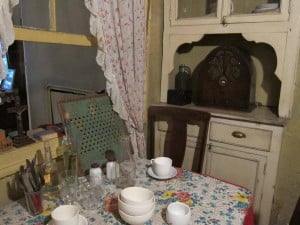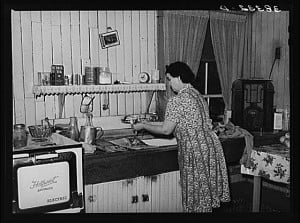Blog Archive
“Washboard Weepers”: Soap Operas in the Days of Radio
If you’ve taken our “Hard Times” tour, you’ve seen how life changed for residents over the course of the building’s history. One of the most dramatic changes came when the building got electricity in 1924. This meant no more smoky lanterns or dangerous gas lights, and eventually, radio! Suddenly the halls were full of music and news as families tuned in to their favorite radio programs.
For Rosaria Baldizzi, the radio provided an exciting link to her Italian culture via radio soap operas. On the “Hard Times” tour, visitors hear Josephine remembering how her mother would “cry all the time” listening to music and soap operas that reminded her of her distant homeland.
Josephine also remembered that she and her brother Johnny used to laugh at the dramatic “screams” they would hear on the radio and tease their mother when she tuned in to hear her soap operas. Their laughter often made Rosaria mad, driving her to tell her children “shut up…you don’t know what they’re saying!”
Created with the American housewife in mind, radio soap operas, also known as “washboard weepers,” were sponsored by manufacturers of household products like facial soap or soap powders and broadcast during the daytime. From the mid-1930s until the mid-1950s, it is estimated that about 50 percent of American women were active listeners.
James Lawrence Fly, Chairman of the Federal Communications Commission, took a dim view of the weepers. In 1943, the Pittsburgh Post-Gazette quoted him as saying that they “…filled the long daylight hours with highly emotional, cheap forms of droolery.”
During the 1930s, the themes of many radio soap operas appealed to listeners struggling to get by during the Great Depression. In Betty and Bob (1932), for example, a young married couple, disinherited by the husband’s millionaire father, is forced to work and save (you can listen to it online here). Likewise, in Marie, the Little French Princess (1933), a wealthy young woman of nobility finds happiness in America’s working class.
— Posted by Kira Garcia

